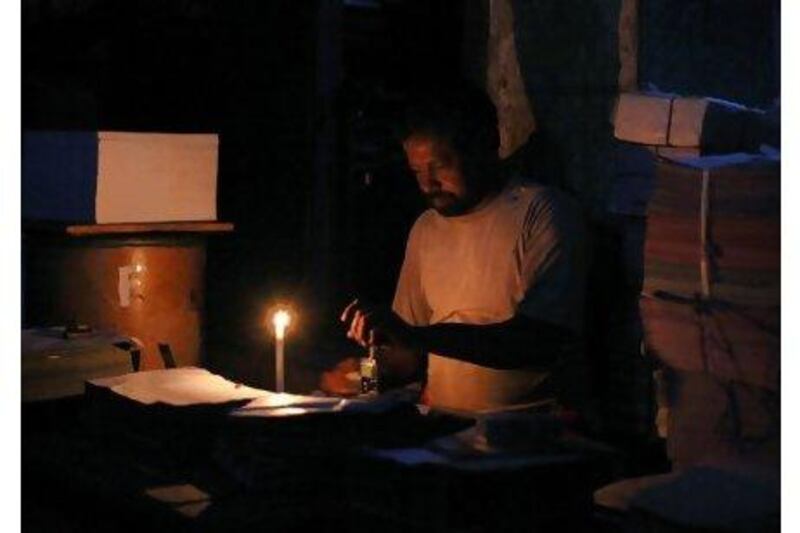ISLAMABAD // Pakistan is pressing ahead with work on two transnational natural gas pipelines, and is talking about a third, as it looks to expand its regional influence after the war in Afghanistan, officials and analysts said.
The most advanced is a project involving the supply of gas from Iran's South Pars field in the Gulf to Multan in Pakistan.
Iran has already laid the section of pipeline up to the border, and construction on the other side would be completed by the end of 2014, the Pakistani minister for petroleum, Asim Hussain, said on Tuesday.
The project has been opposed by the US, because of its adversarial political relationship with Iran. In 2008, India withdrew from the project and shortly after signed an unprecedented agreement with the US providing for the transfer of nuclear power technology.
Iran called off talks about India's participation in the project in June.
Pakistan suffers from chronic power and gas shortages, and is pursuing the project as a priority, despite frequent US criticism, officials said.
Mr Hussain said: "Our dependence on the Iran pipeline is very high … There is no other substitute at present to meet our growing demand for energy."
The pipeline would meet about 20 per cent of Pakistan's demand for gas, and could eventually supply as much as half, analysts based in Islamabad said.
Pakistan has invited China, its northern neighbour and closest ally, to take India's place in the project, officials have said.
In a meeting on June 17 in Islamabad, Mr Hussain also invited Chinese business executives to invest in laying a gas pipeline from the Beijing-funded Pakistani port of Gwadar to the western Chinese province of Sinkiang.
He did not mention prospective supply sources for gas, which would have to be imported.
While the US opposes the Iran-to-Pakistan gas pipeline, and often criticises Pakistan's increasing gravitation towards China, analysts said it was supportive of the so-called Tapi project to pipe natural gas from Turkmenistan via Afghanistan to consumers in Pakistan and India. The analysts said American support reflected the desire to break Russia's dominance over Central Asian gas supplies by facilitating alternative export routes.
Officials from the four Tapi participant countries are working to meet a deadline of July 31 to finalise the pricing of gas from Turkmenistan, set at a meeting of their energy ministers in New Delhi on April 28. An inter-governmental agreement signed last year called for gas to start flowing from Turkmenistan's Yoloten-Osman field by June 2016.
Analysts based in Islamabad said Pakistan was seeking to use its geostrategic location at the juncture of Central Asia and the subcontinent to boost its struggling economy and increase political influence, ahead of the eventual departure of US troops from Afghanistan.
Mushahid Hussain, a politician and chairman of the Pakistan China Institute, an independent think tank, said: "The joke in Islamabad is that you might have a pipeline-i-stan in the offing. That's the future: closer collaboration among regional countries, leveraging your role, position and natural resources that many of us have and need."
He said Pakistan realised it had "missed the bus by obsessing for a decade purely about Afghanistan and ignoring Central Asia".
The Tapi project also has a controversial past, having first been proposed by the US energy firm Unocal in 1995, which was represented by Hamid Karzai, now the Afghan president, during three years of negotiations with the Taliban regime.
US backing for the project has secured commitments of financing for the Turkmenistan pipeline from the World Bank and Asian Development Bank.
But analysts pointed to the obvious difficulty of implementing the project when the outcome of the war between US-led troops and the Taliban is anything but decided.
Afghan officials have said much of the planned 735-kilometre stretch of pipeline across Afghanistan would be underground, and local tribes paid to protect it from attack.
There are also doubts that Turkmenistan possesses enough gas.
Fazal ur Rehman, a director of the Islamabad-based Institute of Strategic Studies, a government think tank, said: "The Iran-Pakistan pipeline is realistic, while the Tapi project depends on the US withdrawal from Afghanistan.
"But Turkmenistan has no authentic certification about how much gas it has, considering that it is looking to supply it to China as well."
Mushahid Hussain, of the Pakistan China Institute, however, argued that the envisaged creation of an "energy corridor" was as much motivated by a desire for regional economic integration as it was by strategic competition.
"Twenty years ago, if somebody had talked of Central Asia opening up with South Asia, you'd have said it was a pipe dream. Ten years ago, if they had said China would build a railway line to Tibet, you'd have said it was a pipe dream," he said.
"It's no longer a pipe dream and I think that, in a decade's time, the geopolitics of the region, backed by energy and economy, will change."





